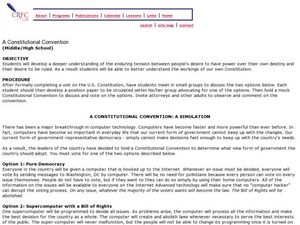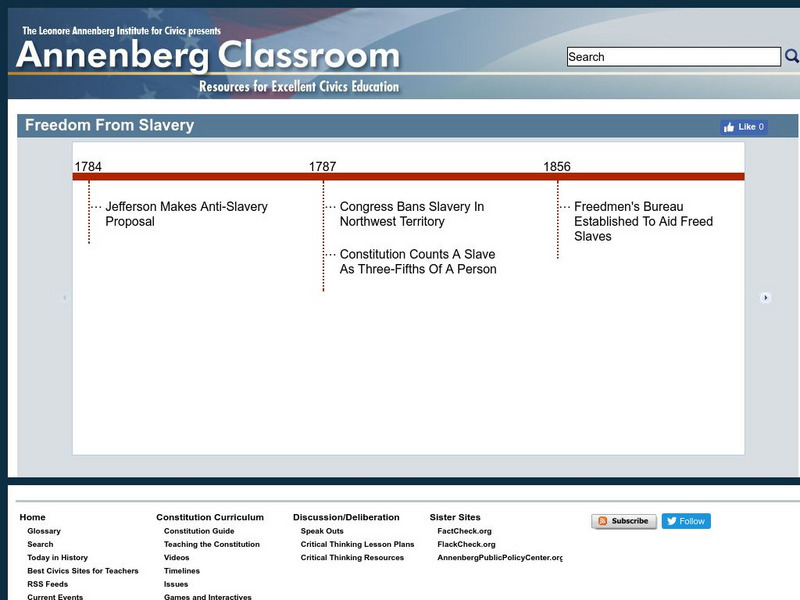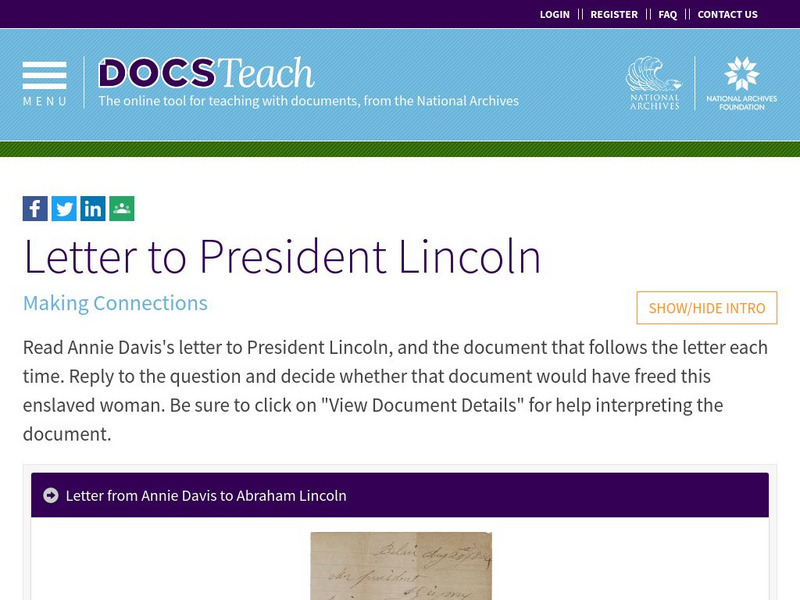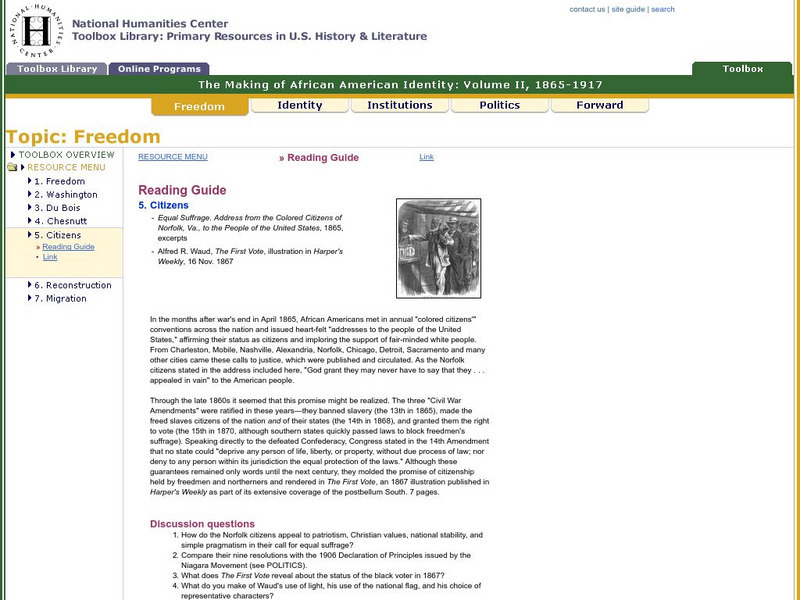Library of Congress
The Emancipation Proclamation and the Thirteenth Amendment
How did the Emancipation Proclamation lead to the Thirteenth Amendment? Middle schoolers analyze primary source documents including the text of the Emancipation Proclamation, political cartoons, photographs, and prints to understand...
National Constitution Center
Interactive Constitution
Did you know there are seven Articles and 27 Amendments to the US Constitution? Explore each and every one of them, including the Bill of Rights and other rights around the world, in a super neat US Constitution interactive.
Curated OER
What price Freedom! Civil War and Reconstruction
Fifth graders become familiar with the events of Reconstruction and the 13th, 14th, and 15th amendments. In this reconstruction instructional activity, 5th graders work in pairs where each student creates a building with blocks and...
Curated OER
John Gary Evans and the Politics of Race
Learners read letters written by Evans and Gunton regarding race relations. In this Progressive Movement lesson, students interpret the intentions and tone of the letters to understand contemporary racial beliefs. Learners discuss the...
Middle Tennessee State University
Fights, Freedom, and Fraud: Voting Rights in the Reconstruction Era
As part of a study of post Civil War era, young historians investigate the changes in voting rights during the Reconstruction Era (1863-1876), the fraud involved in the Hayes-Tilden presidential election of 1876, and efforts by Pap...
Curated OER
Segregated America
Students investigate Jim Crow laws. In this segregation instructional activity, students analyze images that display American segregation. Students use the provided questions to aid them in their evaluation of the images.
Curated OER
A Time for Justice
Students engage in a lesson that focuses on the development of The Bill Of Rights in the United States. They conduct research using a variety of resources. Students two focus questions in order to guide the information search. They state...
Kentucky Department of Education
Kentuckians in the Civil War Era: Constructed Response Essay
What part did Kentucky play in the Civil War? A constructed response essay assignment tests to ensure scholars understand the concepts and the arguments for the causes of the Civil War. Learners must read a primary source quote and then...
Curated OER
A Time for Justice
Young scholars explain the protections and privileges of individuals and groups in the United States.
University of California
The Civil War: Emancipation
Investigate and analyze Abraham Lincoln's Emancipation Proclamation using primary and secondary sources. The sixth installment of an eight-part series analyzes the meaning of Lincoln's document in relation to its impact on the Civil...
Roy Rosenzweig Center for History and New Media
Reconstruction
When slavery ended, what did the government do to help African American during Reconstruction? An interesting instructional activity uses primary sources such as newspaper articles to help scholars analyze Reconstruction policies and how...
Curated OER
Essentials of the US Constitution
Students determine how the content of the U.S. Government enables the U.S. Government to function. They examine the roles and functions of the three branches of government and how the separation of powers and checks and balances affect...
Curated OER
A CONSTITUTIONAL CONVENTION: A SIMULATION
Students discuss two computerized options to change the current U.S. government. In this Constitutional Convention instructional activity, students write a statement advocating for one of the choices and participate in a mock modern...
Curated OER
Lesson 8: After Slavery: Stowe's Vision
Eighth graders read Uncle Tom's Cabin by Harriet Beecher Stowe.
Curated OER
Civil Rights: An Investigation
Learners take a closer look at the political side of the American Civil Rights Movement. In this 20th century American history lesson, students research the contributions of President Johnson, Dr. Martin Luther King, Jr., and J. Edgar...
Curated OER
Keep It Academic
Learners study various methods to learn about religion in the classroom. In this religion study lesson, students read and visit links to learn about various ways of teaching religion in schools. Learners learn the model world religion...
US National Archives
Nara: Charters of Freedom: End of Slavery in the United States: 13th Amendment
Online exhibit of primary source documents related to the 13th Amendment after the Civil War and the end to slavery.
Annenberg Foundation
Annenberg Classroom: Freedom From Slavery
Check out this interactive timeline of the history of freedom from slavery in the United States.
PBS
Wnet: Thirteen: Slavery and the Making of America: Freedom & Emancipation
Using primary documents, oral histories and other historical resources, learn about the African American reaction to emancipation and to events from the Reconstruction period following the Civil War.
Ducksters
Ducksters: Holidays for Kids: National Freedom Day
Kids learn about National Freedom Day. This site discusses the history and facts about this holiday which commemorates the 13th amendment.
A&E Television
History.com: Black History Milestones
A detailed account of the history of African Americans is presented in this article. Divided by main topics or periods of time, the coming of slavery to America is the first focus. Followed by plantation life and escapes to freedom and...
iCivics
I Civics: Dred Scott v. Sandford (1857)
This mini-instructional activity covers the basics of the Supreme Court decision that determined that Dred Scott, having lived in a free territory, was not entitled to his freedom. Students learn about the impact of the Court's decision,...
US National Archives
Docsteach: Letter to President Abraham Lincoln From Annie Davis
Students will study a letter from Annie Davis, a woman who was enslaved in Maryland and wrote a letter to President Abraham Lincoln during the Civil War to find out if 'we are free.' The students will decide if she received her freedom...
National Humanities Center
National Humanities Center: Toolbox Library: Citizens: African American Identity: 1865 1917
Discusses the efforts of African Americans to be recognized as equal citizens after the Civil War, and the 13th, 14th, and 15th Amendments. Includes links to supplemental information.
























